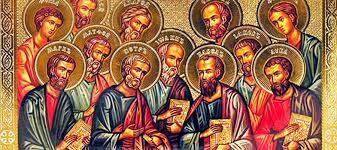
A collection around the following 6 categories to explore:
![]()
St. Peter's Episcopal Church, Port Royal, VA

We are a small Episcopal Church on the banks of the Rappahannock in Port Royal, Virginia. We acknowledge that we gather on the traditional land of the first people of Port Royal, the Nandtaughtacund, and we respect and honor with gratitude the land itself, the legacy of the ancestors, and the life of the Rappahannock Tribe. Our mission statement is to do God’s Will in all that we do.

Twenty-Fifth Sunday after Pentecost Sunday Nov. 10, 11am.

Here’s a fun romp through history, with a little inspiration from Gilbert & Sullivan.
How many of these saints are you familiar with?

From “VCS the Visual Commentary on Scripture – The One Who Dwells
“Psalm 91 is among the most frequently cited passages of Scripture in the Jewish and Christian traditions. It features frequently in liturgies, sacred music, and devotional writings. Visual artists throughout history have responded to its vivid metaphorical language. But the psalm also appears in other, often surprising places: etched into pendants, printed on camouflage bandanas to wear into military combat, and, during the Covid-19 pandemic, emblazoned on masks. Satan himself quotes the psalm when he tempts Christ in the wilderness (Matthew 4:5; Luke 4:9–11). These various uses suggest the enduring attraction of the psalm’s expansive promises of protection.

“The smile that covered a "multitude of pains" was no hypocritical mask. She was trying to hide her sufferings – even from God! – so as not to make others, especially the poor, suffer because of them. When she promised to do "a little extra praying & smiling" for one of her friends, she was alluding to an acutely painful and costly sacrifice: to pray when prayer was so difficult and to smile when her interior pain was agonizing.”
― Brian Kolodiejchuk, Mother Teresa: Come Be My Light: The Private Writings of the "Saint of Calcutta"
“There is so much deep contradiction in my soul. Such deep longing for God – so deep that it is painful – a suffering continual – and yet not wanted by God – repulsed – empty – no faith – no love – no zeal. Souls hold no attraction – Heaven means nothing – to me it looks like an empty place – the thought of it means nothing to me and yet this torturing longing for God. Pray for me please that I keep smiling at Him in spite of everything. For I am only His – so He has every right over me. I am perfectly happy to be nobody even to God. . . .
Your devoted child in J.C.M. Teresa”
― Brian Kolodiejchuk, Mother Teresa: Come Be My Light: The Private Writings of the "Saint of Calcutta
" “Don’t look for big things, just do small things with great love…the smaller the thing, the greater must be our love.”
― Mother Teresa, Come Be My Light: The Private Writings of the Saint of Calcutta
“Our poor people are great people, a very lovable people, They don’t need our pity and sympathy. They need our understanding love and they need our respect. We need to tell the poor that they are somebody to us that they, too, have been created, by the same loving hand of God, to love and be loved.”
― Mother Teresa, Come Be My Light: The Private Writings of the Saint of Calcutta

The Episcopal Church in its convention in Louisville Ky elected its youngest Presiding bishop on June 26, Bishop Sean Rowe, 49. Rowe, who will be the 28th presiding bishop, has been bishop of the Diocese of Northwestern Pennsylvania since 2007 and bishop provisional of Western New York since 2019.
Addressing his fellow bishops and delegates to the meeting after his election, Bishop Rowe called for the church to be courageous and resilient heading into what he described as an “existential crisis” caused by a changing world. He suggested he would encourage the denomination to focus on local dioceses and congregations and streamline its national structure so it doesn’t “collapse under its own weight.”
He compared the denomination’s uncertain status to his experience growing up in western Pennsylvania in the 1980s, as factories closed and friends moved away. But he also expressed optimism. “God is calling us ever more deeply into the unknown,” he said. “Let us follow Jesus into this unknown future filled with hope.”
He will be installed in November after Bishop Curry completes his term at the end of Oct., 2024.

Today’s readings are filled images of growth and newness. From the cedars of Ezekiel in the Old Testament to the palm tree of the psalm, the flourishing of human beings is part of all creation’s fruitfulness.
What is growth ? Not physical growth but actions that expand God’s kingdom. It would also included new capabilties that we obtain.
We start small like the mustard seed. We can become “greatest of all shrubs” but we must grow. Often growth is not straight path. At times we grow fast. Other times, we are stymieed – we have to step back and do something different
The important is to consider how we might want to expand God’s kindom in our area. This is so important since if we don’t nothing may happen. We might sense the possibilities of God’s kingdom ourselves here and work toward that end. We might get that new idea.
In many cases, we can’t do it alone but must work with others. We scatter seed — that’s our role. Our seed may go to others and get a boost from them.
I can think over my time at St. Peter’s and the remembers the seeds scattered the ones. that successully expanded our vision – the Village Harvest, Shred-it, Sacred ground as well the work the ECW and ECM do. Those don’t exist in a vacuum but are formed by the many. Some have the vision; others can organize; others are problem solvers.
But don’t worry about the efforts that are doomed to failure that you don’t try or the ones you do try that fail. Sometimes failures can be reworked and become successes. Ultimately it depends on God’s grace.
We had a ministry of pastoral care – “Ond Day” where the congregation come together and do pastoral care together. Sounds great but it didn’t last beyond one time and it has not been repeated. What I cam guessing is that existing ministries were doing that jog and no other organization was ndded.
For Caroline, Wednesdays, 10:30am to 1:30pm at various sites.

Because of…
1. The arrival of the Holy Spirit. That will be symbolized by the “Tongues of Fire” resting on the disciples. Lots of red for the Holy Spirit will be worn tomorrow
2. The birthday of the Church. The Acts of the Apostles in the New Testament provides the account of that as well as the missionary journeys of Paul in several books of the New Testament
3. the Bishop visitation to St. Peter’s. 3 youth to be confirmed and 3 adults to be received
4. A luncheon afterward Food provided by parishioners and the Little Falls Bluegrass Band providing the music
5.A time to bring us together. Language was no barrier at Pentecost
the last stanza from Jan Richardson’s poem at Pentecost,
WHEN WE BREATHE TOGETHER
This is the blessing
that blazes among us
when we speak
the words
strange to our ears,
when we finally listen
into the chaos,
when we breathe together
at last.

Prayer Walking – The God who walks with us. By Sammy Jordan
Prayer Walks. It’s a great way of connecting with our communities and connecting with God for them on a whole new level.
Prayer walking is not for the super spiritual. Prayer walking is for everybody. Prayer walking is very simple you don’t have to say or do anything other than invite God to go on a walk with you.
Scriptural basis
1 In Genesis it says Adam and Eve heard God walking in the garden and when we
walk and pray we need to remember that God walks with us for me being
physically present amplifies my sense of connection to both God and the people
and place I’m praying for I love.
2 Jeremiah 29:7 seek the welfare of the city where I have sent you into Exile and pray to
the Lord on its behalf for and, this is the bit I love, in its welfare you will
find your welfare. It inspires and encourages me to pray for bless and serve my community because my well-being and flourishing is connected with it.
Remember when you’re putting on your shoes you are putting on shoes of peace!
How can you pray for peace and blessing for your community as you walk? Notice where God pro prompts you to pause and pray stop outside neighbors doors maybe use their their names as you pray for peace to enter their home. Do the same thing for
shops schools and businesses in your area. I often use road signs and markings to help me pray.
Crossroads remind me to pray for people with decisions to make, stop signs or red traffic lights for people who feel stuck, amber lights and also bus stops for people who are waiting, and green lights for people who are going people who are responding and doing something new.
I also love to use nature it reminds me of growth what is God growing in our communities.

Four Sundays of May commemorating agriculture, the Ascension, Pentecost and Trinity Sunday – are four feasts of great importance in the life of the Church. They are distinctively “named” Sundays.
Rogation Sunday on May 5 (Easter 6) goes back to prayer and fasting in early Christian times for protection for crops from disease. It was also a reflection of the Roman holiday of Robigalia at which a dog was sacrificed to propitiate Robigus, the god of agricultural disease. In England they were associated with the blessing of the fields at planting. The vicar “beat the bounds” of the parish, processing around the fields reciting psalms and the litany. In Christian years it involved fasting and abstinence in preparation for celebrating the Ascension. Traditionally, Rogation days are the three days before Ascension Day on which the litany is sung (or recited) in procession as an act of intercession.
The Ascension (May 9, celebrated May 12) is usually described as marking the completion of Jesus’ ministry on earth as he returned to Heaven. But it is far more than that. It marks the exact moment when Jesus, Son of God, commissioned his disciples to begin the gigantic task of converting the whole world. As recorded in St Mark’s Gospel, Jesus said: “Go into all the world and proclaim the good news to the whole creation. The one who believes and is baptized will be saved; but the one who does not believe will be condemned.”
Luke tells us that Pentecost (May 19) occurred a short time after the Ascension, and marked the fulfillment of Jesus’ promise, at his Ascension, to send the Holy Spirit on the disciples.
The gift of the Holy Spirit electrified these fearful followers – who only weeks before had run away when Jesus was arrested, and were still hiding for fear of those who had been responsible for their Lord’s death – and transformed them into men and women willing to lay down their lives for their faith, as many of them did.
The feast of Holy Trinity (celebrated May 26), though logically linked with the other two, was established much later. Although its existence was clearly stated in the New Testament, and early recognized as a doctrine of the faith, it was only when the Arian heresy – which denied Jesus was God – was spreading in the fourth century, that the church Fathers prepared an Office with canticles, responses, a preface, and hymns, to be recited at Mass. From these, the feast we now celebrate as Trinity Sunday gradually evolved.
Together, these latter three great feasts mark the promise which Jesus gave to his disciples, and its fulfilment in the Church on earth. As recorded by Matthew, the very last words Jesus said to his Apostles before going up to Heaven, were: “Go therefore and make disciples of all nations, baptizing them in the name of the Father and of the Son and of the Holy Spirit, and teaching them to obey everything that I have commanded you. And remember, I am with you always, to the end of time.”

This is a blog episode for the SALT project. SALT is an Emmy Award winning, not-for-profit production company dedicated to the craft of visual storytelling
It is hosted by SALT’s Matthew Myer Boulton, who’s spent twenty years teaching the Bible and theology to students at Harvard Divinity School and seminaries in New England and the Midwest,
There is a part 2 of their 7 part series “Undertanding Easter” titled “10 Ways of Understanding the Cross”
Links
1. Audio file
2. Text

We had 8 people online for the first class, Feb 21, 2024.
Weekly Sessions
1. Why we have the creeds and the origin?
2. Creed about God – “I believe in God, the Father almighty”.
3. Creed about Jesus.
4. Creed about the Holy Spirit.
5. Creed about baptism, resurrection.
Creeds are ultimately for the unity of the Church containing the beliefs that are central to the faith. They hold us together. They are used to teach new members.
Almighty God, you have created us out of the dust of the earth: Grant that these ashes may be to us a sign of our mortality and penitence, that we may remember that it is only by your gracious gift that we are given everlasting life; through Jesus Christ our Savior. Amen.
We began our observation of Jesus’ death and resurrection by preparing for Easter with a season of penitence. Ash Wednesday is the first day of Lent. We had 17 in attendance. Sally Hartman who did her vocational discernment at St. Peter’s and now is a Deacon was the preacher.
The church changes its look encouraging you to see things differently – purple on the altar, minimal flowers, pottery communion cup, a special red processional cross.
The liturgy provides words about the purpose of Lent. “I invite you, therefore, in the name of the Church, to the observance of a holy Lent, by self-examination and repentance; by prayer, fasting, and self-denial; and by reading and meditating on God’s holy Word.”
It is all about reconnecting with God with by these specific activities and others of your choosing. Examine yourself to see what divides you from others, from the earth and from God, and repent from these divisive things. As the bulletin stated “only God can take away our sins, create clean hearts in us, renew a right spirit within us, and sustain us with God’s bountiful spirit.” The sermon enouraged us not to just give up but to take on new practices to do that and see other possibilities in the world.